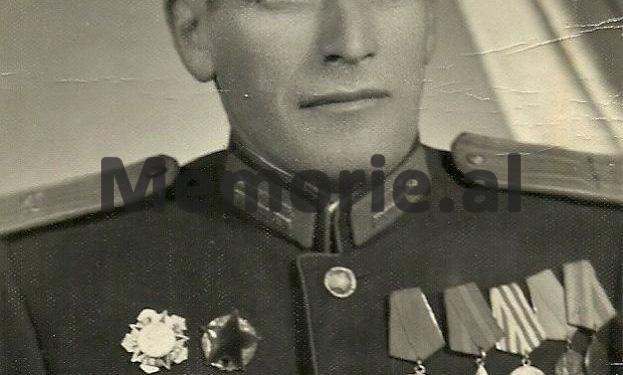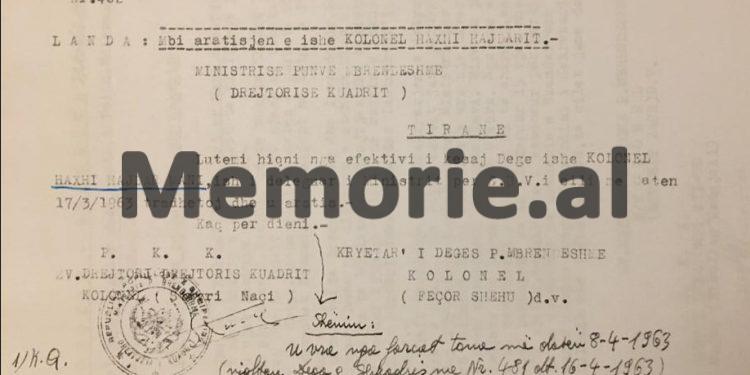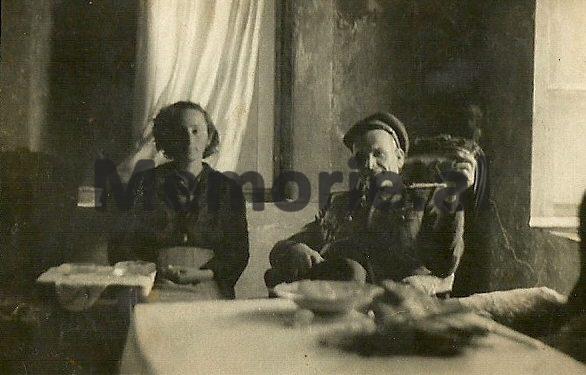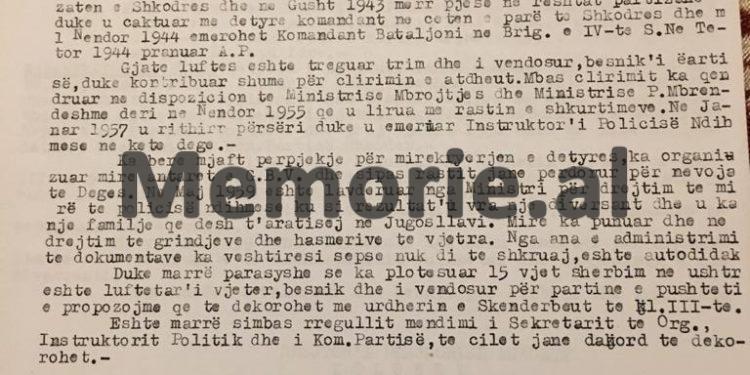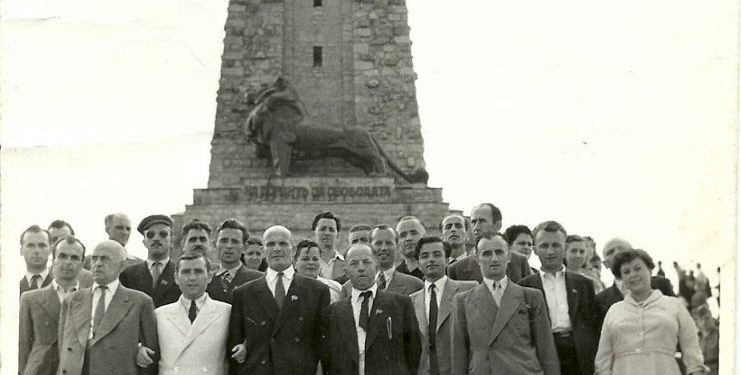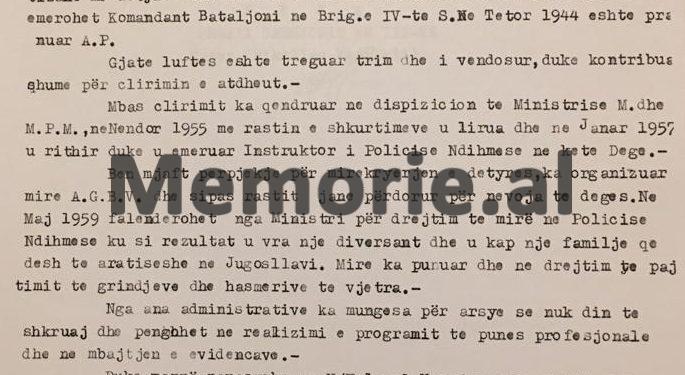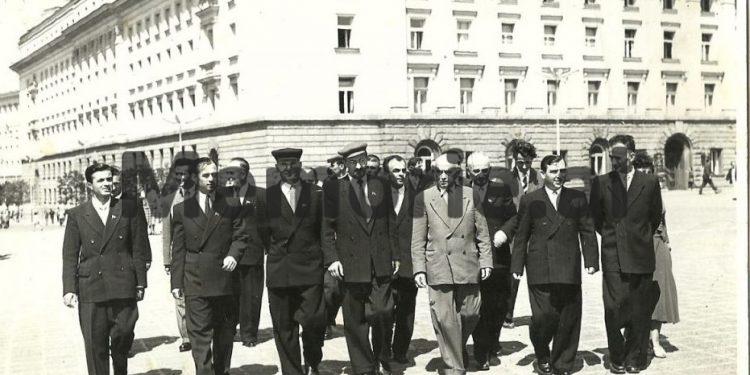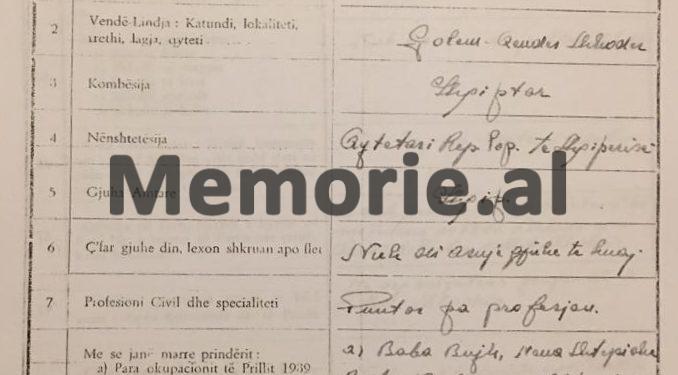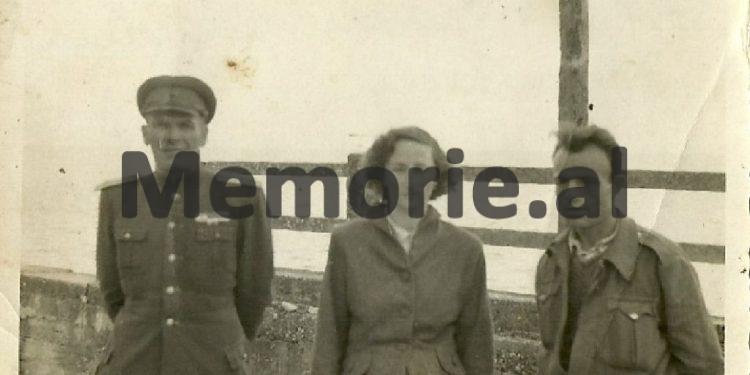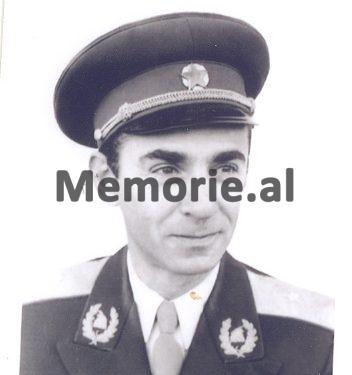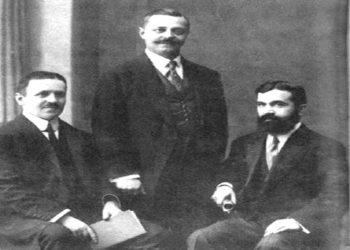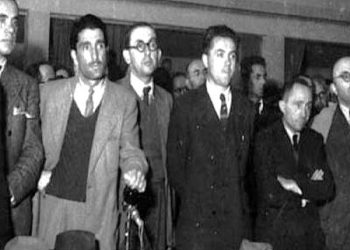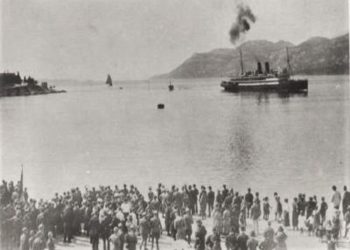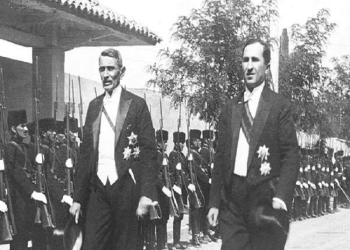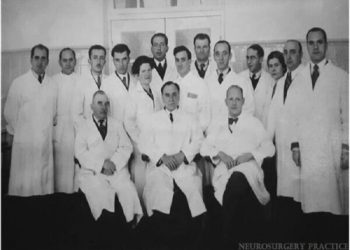Dashnor Kaloçi
Memorie.al publishes the unknown and painful story of Colonel Haxhi Hajdar Manit, former commander of the first partisan platoon of Shkodra Region, deputy of Malësia in the People’s Assembly and Commander of the Border and Voluntary Forces of the district, who at the beginning of the 1960s opposed the collectivization of remote mountainous areas, considering it to be accelerated. The debate in the meeting of the Plenum of the Party Committee of Shkodra district in the presence of Mehmet Shehu and the call the next day in the office of Enver Hoxha, where the Commander-in-Chief of the Armed Forces said: “Comrade Haxhi, we cannot make way in Malësia e Shkodrës, because we give Tito the opportunity to attack us through her …”. The State Security plan to publicly arrest the rebel MP in plenary session, escape to the mountains and search operations involving over 11,000 military and volunteer forces and his execution with artillery in the Rrjoll cave, along with his friend’s son, Nosh Paja, who accompanied him from the day he decided to flee …!
The decision of the Political Bureau of the Central Committee of the ALP in the late ’50s to collectivize agriculture in mountainous areas, not only was not well received by the large mass of the peasantry in all provinces of the country, but he encountered strong resistance even from many honest communists and leading cadres with high party and state functions of that time, who in various ways, raised their voices and did not agree with the drastic measure that was being thrown at the peasantry as’ rope around the neck ‘. One of those who openly opposed the directive of the senior leadership of the ALP and its creator, Enver Hoxha, was the deputy of the Shkodra Highlands, Colonel Haxhi Hajdar Mani, who since the end of the War also served as Commander of the Forces of Border and Voluntary Forces of Shkodra Region. In the early 1960s, he raised the issue in the Shkodra District Party Plenum, where Prime Minister Mehmet Shehu was delegated, and then in one of the plenary sessions of the People’s Assembly. His discussion fell like a bomb on all the deputies and it is still unknown to this day why the State Security scenario was not realized, to publicly arrest Colonel Haxhi Hajdari in the premises of the People’s Assembly? It is said that one of his close friends, a senior State Security officer (Colonel Mit’hat Zaçe), informed him of his arrest in plenary session and Haxhiu managed to sneak out of Tirana. In the late hours of that night, after changing two cars during the trip, he went down to the entrance of Baçallëk and from a secondary road he arrived at his house, on the outskirts of the city of Shkodra. Nearly three months later, on March 15, 1963, in the late hours of the night, a few taps were heard at Haxhiu’s house in the village of Golem. With a revolver in his hand, Haxhiu came out on his own to open the door. Behind her, stood his close friend, who only three months ago had informed him to leave Tirana urgently.
After standing for a few minutes to make sure there was no movement around the house, they went inside. It is not known exactly what was discussed that distant evening in March 1963, between two old friends from the time of the War, the senior State Security soldier coming from Tirana and the owner of the house!? And to this day, when 57 years have passed since that night, everything has remained shrouded in mystery. But one thing is correct: The next night, in the direction of the house of Haxhi Hajdar Mani, there in Golem of Shkodra, three “Jeeps” of the State Security arrived. One of the senior officers who came down from them to look for the colonel, was holding in his hands the radiogram coming from the Ministry of Interior, where it was written: “To catch Haxhi Hajdari at any cost”. But he was not there. He left the house a few minutes after the guest came from Tirana.
Follows from the previous number
Removal of Haxhi Hajdari from all functions!
Although he was quite tired from the long road, Haxhiu woke up that night without putting any sleep in his eyes. He recalled everything that had happened to him and very rarely exchanged a word with his wife, Xhemalien. It was January 1963 and only three years ago, for special merits, Haxhiu was given the rank of colonel. From the beginning of January to the middle of March, he was almost completely removed from all his functions. During the meetings that took place in the Shkodra Branch of Internal Affairs, the conflicts with the chairman Feçor Shehu, continued to be aggravated more and more. He left home only in the morning when he showed up for work and returned very soon to his family. All the friends and comrades who once accompanied him were gone. No one approached him, even for a coffee! He was in this situation from the day he discussed in the People’s Assembly, where, among other things, he said: “Shkodra, and in particular Malësia, is very poor. “The time has not come to collectivize in the deep mountainous areas.” Three months later, on March 15, 1963 (Saturday), one of his closest friends serving in the State Security, Colonel Mit’hat Zaçe, left Tirana and went to Haxhiu’s house. in Golem, on the outskirts of Shkodra. The two old friends from the time of the War, locked in a room, talked alone to each other until the early hours of the morning. Shortly before dawn, the colonel from Tirana left his friend’s house. A few minutes later, Haxhiu himself left. Meanwhile, only a few hours later, in the direction of his house, some “Jeeps” of the Internal Branch of Shkodra and the State Security started coming from Tirana. Strangers who came down from them entered the house and interrogated Haxhiu’s mother and wife. “Where is Haxhiu, where did he go and at what time did he leave the house?! “Who was at home with him last night and what messages did he leave for them?”, Were some of the most frequently asked questions by senior State Security officers.
Haxhiu escapes to the mountains
From that day, the news that Colonel Haxhi Hajdar Mani had escaped was spread all over Shkodra. In the houses of the people of Shkodra or in the bars and cafes of the city, that Sunday in March there was no other conversation, except that of Haxhi Hajdari. The words that circulated around him were of the most varied and all kinds of versions, from the most incredible were told about the escape of the rebel colonel who was known to the whole Shkodra Region. Meanwhile, along with that news, the other fact was learned, that the alarm was given in all military units of Shkodra district and other districts such as: Lezha, Puka, Mirdita, etc., which had passed in combat readiness no.1 (same as in a state of war). The main military forces of the Shkodra Region and those that came to reinforce from Tirana, were deployed along the state border, making its total blockade. The search operation to capture the rebel colonel and MP in the field was led by the border director of the Ministry of Interior, Major General Teki Kolaneci. While from Tirana, the operation was led directly by the Prime Minister Mehmet Shehu, who informed the Commander-in-Chief, Enver Hoxha, hour by hour by phone. In that operation, by order of the Prime Minister, more than 11 thousand military and volunteer forces were engaged, urgently mobilized in the morning hours of March 15, 1963, when the news of Haxhi Hajdari’s escape was learned.
Hiding the deputy in Rrjoll Cave!
But where was the rebel colonel and how could he leave the house, which had long been under the surveillance of the State Security men? Who was the man who helped him leave the house and where did Haxhi Hajdari take refuge? According to some testimonies confirmed by the people of the Hajdari family, the most probable version is this: His close friend, Colonel of the State Security, Mit’hat Zaçe, who in the late hours of the night at dawn on March 15 went at Haxhiu’s house, informed him of the danger that was threatening him. To escape arrest, Haxhiu decided to escape and go to the mountains. After this decision, he sent words to Dodë Prekës, (his close friend from the village of Rrjoll) who that night sent his 27-year-old nephew, Nosh Paja, home to accompany Haxhiu from Golem to his house. of them in the village of Rrjoll. According to his uncle’s order, Noshi went to Golem, where he took Haxhiu and accompanied him without being dictated by anyone to Doda’s house in the village of Rrjoll. Haxhiu entrusted that to Doda, as he had one of his most loyal men, since the time of the War, when he was the commander of the first partisan detachment of the Shkodra Region and occasionally took refuge in that base. When Haxhiu arrived at that house, Doda told his old friend to stay there as long as he wanted, without worrying at all. However, not wanting to harm them in a possible case that could be dictated by the people of the State Security, Haxhiu asked Doda to allow him to leave the house, after first finding a place for him. convenient in any cave, where he would hide. The cave should not be too far from the house, as they had the opportunity to supply it with bread and water. Dodë Preka initially refused to take his friend out of the house, saying that he could not be harvested in front of Malësia. But after much hesitation and debate, Doda obeyed his friend and assigned his brother’s bride, Pashken, (who was a shepherdess) to accompany and hide in a cave, his friend’s house, Haxhi Hajdari. It is said that the 60-year-old Easter took it upon herself to hide the friend of the house (without asking her brother-in-law, Doda), as her brothers were also close friends of Colonel Haxhi Hajdar Mani. Doda and his men also decided not to leave their friend alone in the cave, taking with him his nephew, Nosh Paja. After that, according to the plan made, accompanied by Pashkja and Mrija, Colonel Hajdari and Nosh Paja, took refuge in a cave not far from their house, which only they both knew. The entrance to the cave was on a rock that fell like a knife into the abyss and at its entrance no more than one man pushed. There in that cave, Haxhiu and Noshi stayed from March 17 to April 8, 1963 (Monday), when they were dictated by the State Security people who for days were part of the search operation and surveyed the entire area with binoculars from afar.
How was the cave discovered where MP Hajdari was hiding?!
But how was it discovered that Haxhi Hajdari with the son of his friend, Nosh Paja was hiding in the cave of Rrjoll? The operation to search and capture him continued until April 7-8, 1963, and on that day, the military forces began to withdraw and group in the town of Koplik, to then return in the direction of their barracks. In the early hours of the morning of April 7, one of the villagers of Rrjollli spotted the movements of Pashkë Preka, who was delivering food to them, and immediately notified the military forces and the State Security. In record time, the army forces that had been grouped in Koplik, returned again to the village of Rrjoll, encircling the place where Haxhi Hajdari was thought to be hiding. They were able to locate exactly the mouth of the cave, which fell into the rock from where it could only be entered by rope from above. From the first hours of April 8, 1963, the whole place near the cave was kept surrounded. The senior officers of the Ministry of Interior and those of the Internal Affairs Branch of the Shkodra Region (under the direction of the Border Director, Major General Teki Kolaneci) studied there in the field all possible versions of how the capture could be carried out. alive of Haxhi Hajdari and Nosh Paja. But they did not reach any conclusion, as due to the very rugged terrain conditions and the location of the cave, their capture alive was completely impossible. In these situations, Haxhiu and Noshi were initially called upon several times to surrender, but their response was several gunshots. Which showed that they did not intend to surrender. At lunchtime, a “Jeep” of the Ministry of Interior arrived near the cave, which had brought from Tirana one of Haxhi Hajdari’s close friends since the war. The colonel, who came from Tirana, (former head of the Shkodra Internal Affairs Branch) approached the cave and with a megaphone in his hand, called on his friend to surrender. Haxhiu’s voice was heard from the mouth of the cave: “Oh …, I did not enter here to surrender alive …”. After that, Tirana was informed that there was no possibility for Haxhi Hajdari to be caught alive, suggesting that he should act in other ways before nightfall.
Execution of Haxhiu with mortars!
From Tirana came the answer that in the direction of the village of Rjoll, another helicopter would depart, with the colonel-general traveling on board. Vaskë Gjino, who had with him the order on how to proceed further with Haxhi Hajdari. Mehmet Shehu’s order, approved by Enver Hoxha, was final: “Haxhi Hajdari to be annihilated with mortar shells in a demonstrative manner …”. Given the fact that Vaskë Gjoni was one of the most trained officers of the Albanian Army Artillery, that task was assigned to him by the Prime Minister Mehmet Shehu himself. (Several years later, when he was serving his sentence in Burrel Prison, General Vaskë Gjino, originally from the village of Dardhë in Korça, himself confessed the whole incident, in front of some of his accomplices, among them Muho Bala, the nephew of the deputy and Colonel Haxhi Hajdari). At around 14:00 on April 8, 1963, after the mortar shells were fired by the general from Tirana, five shells hit the entrance of the cave, completely destroying it. After the destruction of the cave, some special forces of the Intelligence Battalion, coming from Tirana, came down with a rope entering it. So, crushed by the shells, they took the two lifeless bodies of Haxhiu and Nosh Paja and threw them from above, rolling them about 30-40 meters down. Afterwards, Haxhiu’s mutilated body was put on a horse and demonstratively walked to all the villages in the area where he had been elected a member of the People’s Assembly and where he had fought during the War as commander of the first partisan platoon in that district. (This was done to terrorize the inhabitants of those parts, where the deputy and colonel Haxhi Hajdari, enjoyed great popularity). After the “success” achieved, by order from Tirana, the whole family of Haxhiu (wife, Xhemialia, together with five children, the eldest 9 years old, Feriti) was sent into exile. Haxhiu’s old mother (80-year-old daughter) with Haxhiu’s sister, Bedrie Hajdari Bala, and her son, Muhon, who was married and had three-month-old children, did not escape exile either. A few days later, Muho Bala was arrested and initially sentenced to death, being charged as an accomplice of his uncle, Haxhi Hajdari. (See the book “Re-conviction” of Fatos Lubonja). He was later pardoned and Muho suffered for 28 years in the prisons of Enver Hoxha’s communist regime, only to be released in 1988. The long list of sentences was closed by Nosh Paja’s mother (the 27-year-old boy who was entered the cave and was killed with a mortar along with MP Haxhi Hajdari), who was sentenced to 25 years in prison. Two years after that event which caused a great commotion not only in the whole Shkodra Region, but also in the North of Albania, the villager who had shown the Security people the cave where Haxhi Hajdari was hiding, was found killed in his house .., while the two villagers, Pjetrush Preka and his brother Doda, were barbarically tortured by the State Security people.
Security strangled the man who sheltered Colonel Hajdari in Rrjoll Church!
During all that period of time (March 16 to April 7, 1963) that Haxhi Hajdari and Nosh Paja remained hidden in the cave, they were supplied with bread and water, only by Dod Preka’s sister-in-law, Pashkja. Also, during those days that they stayed hidden in the cave, the military and civilian forces continued uninterruptedly the operation for their search, controlling all the houses of Malësia above and below Shkodra, where Haxhiu had many friends. Great searches were made especially in the border area, although the State Security knew very well that Haxhiu did not escape, because as the highlanders said: “The Yugoslavs did not exchange him even with mutton …”! After many searches, the State Security suspected the house of the Prekaj in Rrjoll and for several days kept it under secret control and surveillance. Not following in Haxhiu’s footsteps, Security forces arrested the two elderly brothers, Pjetrush and Dodë Preka, asking them to indicate where Haxhi Hajdari might have been hiding. They, after showing nothing, were barbarically tortured by the Security forces that were deployed in the church of Rrjoll. Pjetrushi died of torture during the day in the church of Rrjoll, without uttering a single word, while Doda was sent to the Shkodra Branch of Internal Affairs, where the torture against him continued. Even Doda, like his brother Pjetrushi, did not utter a word and a few days after the discovery of Haxhi Hajdari’s murder, he sentenced to 18 years in prison.
The persecuted: “The former dissident MP should be praised for his work and Shkodra should be proud of the figure of Haxhi Hajdari”
Even after April 8, 1963, when by order of the senior leadership of the ALP in Tirana, the colonel and dissident MP of the Shkodra Highlands, Haxhi Hajdar Mani, was executed with artillery shells in the cave of Rrjoll, the communist regime of Enver Hoxha he could not erase from the memory of the inhabitants of those parts that macabre event. Unlike the official propaganda of the regime that erased his name, the highlanders above and below Shkodra, although under voice, constantly remembered with deep respect the name and figure of their former MP, who in the early ’60s – opposed the directive of the ALP, calling premature the collectivization of deep mountainous areas. Some of the prisoners and political persecuted in the city of Shkodra, contacted by Memorie.al, highly appreciate the work of former colonel and MP Haxhi Hajdar Mani, saying that Shkodra should be proud of his figure. But according to them, even though almost 30 years have passed since the collapse of the communist regime, it is unfortunate that the competent official bodies in the city of Shkodra and Tirana, have forgotten his name and figure. “It first belongs to the Municipal Council of Shkodra, to officially give Haxhi Hajdar Mani, the place he deserves in the history of this city …”, say some of the politically persecuted, not without indignation. Memorie.al




